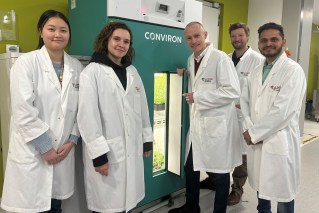‘Cultured’ chicken: Consumers to get a taste of lab-grown meat in world first

No longer the stuff of science fiction, no-kill meat is busting out of the labs and onto menus and plates.
In a world first, food regulators in Singapore granted approval for slaughter-free ‘cultured’ meat – grown from cells in a lab – to be sold to the public.
The Singapore Food Agency reviewed and approved an application from San Francisco-based company Eat Just to allow the sale of its cell-cultured chicken product.
Eat Just labelled the decision a “world first” for lab-grown meat, and said its no-kill chicken would be produced in partnership with local manufacturers and be offered to restaurants before it hits store shelves.

To make no-kill meat, cells are taken from a live animal and cultured in a lab. Photo: Getty
To produce its ‘no-kill’ chicken, Eat Just sourced cells from a living chicken via a biopsy.
The cells were then ‘cultured’, put into a bioreactor, and fed a variety of proteins and other necessary nutrients until they are ready to harvest.
No antibiotics were used and the end product has an “extremely low and significantly cleaner microbiological content than conventional chicken,” Eat Just said.
Slaughter-free meat comes of age
With its likely origins in a live animal market, the COVID-19 pandemic has thrown a spotlight on the risks posed by humanity’s hunger for animal flesh.
With scientists warning of the role meat could play in triggering future pandemics, the demand for alternatives is growing.
Cultured meat is not yet available in supermarkets, but the “proof of principle” has been made: Real meat can be produced without killing animals, said Professor Johannes le Coutre, from the University of New South Wales’ School of Chemical Engineering.
The technology and facilities used to make so-called ‘cultured’ or ‘cultivated’ meat “will be much less prone to amplifying pandemics the way our conventional factory farms and meat-processing plants globally have been doing”, Professor le Coutre said.
Indeed, lab-grown meat has already come a long way since the world’s first cultured beef burger was produced by Professor Mark Post at Maastricht University in The Netherlands in 2013.

Meat’s role in the coronavirus pandemic has fuelled a hunger for alternatives. Photo: Getty
The famous burger took three months to grow and cost a staggering $410,000. It was then fried and eaten at a London restaurant.
“Since then, the race has been on to produce commercially available synthetic meat,” explained Leigh Ackland, a biosciences professor at Deakin University.
“Many companies have taken out patents to grow meat on a commercially viable scenario and even received funding from people like Bill Gates and Richard Branson.
“Thanks to advances in tissue engineering, we can take all sorts of cells ranging from skin and blood to muscle and the brain from different animals, and grow them under controlled laboratory conditions.”
Lab-grown kangaroo on the cards
Lab-grown meat isn’t available to consumers in Australia yet, but the race is on to create a product that will appeal to local tastebuds.
One of the nation’s forerunners is Vow, which started last year, headed by Tim Noakesmith and George Peppou.

Vow’s kangaroo dumpling, the first cultured meat from an undomesticated animal. Photo: Vow
It was the first company in the world to make a food prototype from an undomesticated animal – using the cells of our very own Skippy to ‘grow’ a kangaroo dumpling.
“It’s safe to say there is excitement about Australia being a great contributor to these innovations,” Mr Peppou said.








